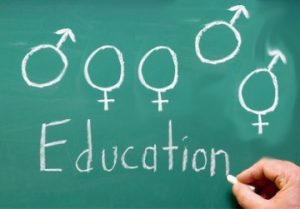 CURE Foundation in 2016 implemented a project entitled “Utilizing the EU integration process for the improvement of LGBT rights in the Western Balkans” with the financial support of Sarajevo Open Centre and State Department of the United States of America.
CURE Foundation in 2016 implemented a project entitled “Utilizing the EU integration process for the improvement of LGBT rights in the Western Balkans” with the financial support of Sarajevo Open Centre and State Department of the United States of America.
As part of this project CURE Foundation created a research titled „What we are silent about when we are silent about the rights of LGBTI persons in textbooks” where we explored high school textbooks in Canton Sarajevo and observed a large number of stereotypes and prejudices in the context of the rights of LGBTI people. With the analysis of educational content in high school textbooks which were approved for usage in schools in Canton Sarajevo in the school year 2015/2016, we wanted to show how and to what extent the textbooks present content from a wide range of LGBTI issues and rights. We wondered whether the terminology used was in accordance with the law and the legal obligations on the elimination of all forms of discrimination in education, whether the terms concerning the LGBTI persons are accurately stated, are the definitions explained and supported by sources and explanations and to what extent data from guided sources is relevant and current.
We were interested also in the frequency of the LGBTIQ terminology, and whether and how are defined and explained the relevant terms: lesbian, gay, transgender, transsexual, intersex, queer persons, and how sex and gender is presented and explained, whether the difference between these two terms is listed and defined. In the curricula we searched for, but did not find, the topic and encouragement to talk about the global LGBTIQ movement and activism, and of, at least brief and superficial, history of the struggle for the rights of LGBTI persons in BiH and the region. We wanted to know what were the educational fields and school subjects in which we could find LGBTI content: whether these were discussed only from the biological side of the story regarding sex, sex hormones, sexual orientation, or, in turn, are gender identity and sexual orientation seen as human rights which is discussed in textbooks of social sciences.
In this research it was of high importance to find, underline and stress all those places where the curriculum opened space to talk about a range of topics from a wide range of rights of LGBTIQ persons, and which the authors of textbooks skillfully managed to ignore.
 The research has shown that there are many of these missed opportunities which are a very targeted and deliberate failures to fill the open space with LGBTIQ content, information and incentives to talk and exchange of critical thinking among students. In the research of textbooks in seven high school subjects it was found that the topics related to sexual orientation, gender identity and LGBTI rights and freedoms are processed in insufficient number of teaching units, significantly discriminatory. In most of the content of the subjects these topics are viewed through the prism of gender, biologically, and homosexuality is largely interpreted as a deviation of heterosexuality, often as perversion and deviance. The rights and prohibition of discrimination on grounds of sexual orientation and gender identity is spoken of little or not at all. The terminology used in textbooks is uneven, often outdated and incorrect and does not follow global guidelines when it comes to respect of the rights of the LGBTI community. The distinction between sex and gender is nonexistent, except in rare, isolated cases, while men and women are shown through gender roles and binary oppositions. Additional problems involve the absolute lack of mentioning of these issues where they are mandatory. Research on the link: http://fondacijacure.org/files/Publikacija%20O%20cemu%20sutimo%20LGBTI.pdf.
The research has shown that there are many of these missed opportunities which are a very targeted and deliberate failures to fill the open space with LGBTIQ content, information and incentives to talk and exchange of critical thinking among students. In the research of textbooks in seven high school subjects it was found that the topics related to sexual orientation, gender identity and LGBTI rights and freedoms are processed in insufficient number of teaching units, significantly discriminatory. In most of the content of the subjects these topics are viewed through the prism of gender, biologically, and homosexuality is largely interpreted as a deviation of heterosexuality, often as perversion and deviance. The rights and prohibition of discrimination on grounds of sexual orientation and gender identity is spoken of little or not at all. The terminology used in textbooks is uneven, often outdated and incorrect and does not follow global guidelines when it comes to respect of the rights of the LGBTI community. The distinction between sex and gender is nonexistent, except in rare, isolated cases, while men and women are shown through gender roles and binary oppositions. Additional problems involve the absolute lack of mentioning of these issues where they are mandatory. Research on the link: http://fondacijacure.org/files/Publikacija%20O%20cemu%20sutimo%20LGBTI.pdf.
After completing the research, CURE Foundation organized a meeting with the Federal Ministry of Education and Science of Bosnia and Herzegovina. Representatives of the Federal Ministry of Education and Science of Bosnia and Herzegovina hosted the representatives of the civil sector with the aim of discussing the abolition of discriminatory content in textbooks for secondary schools of the Canton Sarajevo.
Representatives of institutions have given a few tips, stating that the Federal Ministry of Education and Science of Bosnia and Herzegovina is responsible exclusively for primary school education and high school textbooks are the responsibility of Cantonal ministries. According to this, they stressed the need to send a letter to the Cantonal Ministry of Education, Science and Youth with concrete examples of discrimination and the ways in which this can be formulated differently. In the event that the Ministry does not respond within 30 days, it is necessary to send an urgent letter, and insist on an answer and respect of the results of research in accordance with the Decision on the procedure of receiving and approving textbooks, work books and other teaching materials for primary and secondary schools. They stressed that it is essential to offer a solution to a given problem and insist on the ethical aspect of the manuscript, which must be taken into account every time a textbook is to be approved. They also stressed that very little new textbooks are printed for high schools and that we must work to correct the old textbooks and make sure that the new editions are printed with corrections.
Proposal for future work was to do the same analysis with primary school textbooks and the Federal Ministry of Education and Science of Bosnia and Herzegovina will absolutely accept to work with the civil sector to implement all the changes in the textbooks. It was also emphasized that in 2018 a new curriculum for primary schools is planned and we should conduct an analysis as soon as possible in order to stop this type of content before in becomes textbook content. Currently CURE Foundation is working on proposals to amend the textbooks in accordance with the findings of the analysis, and is expecting a meeting with the Cantonal Ministry of Education, Science and Youth.
 Using EU integration for improvement of LGBT rights in Western Balkans
Using EU integration for improvement of LGBT rights in Western Balkans